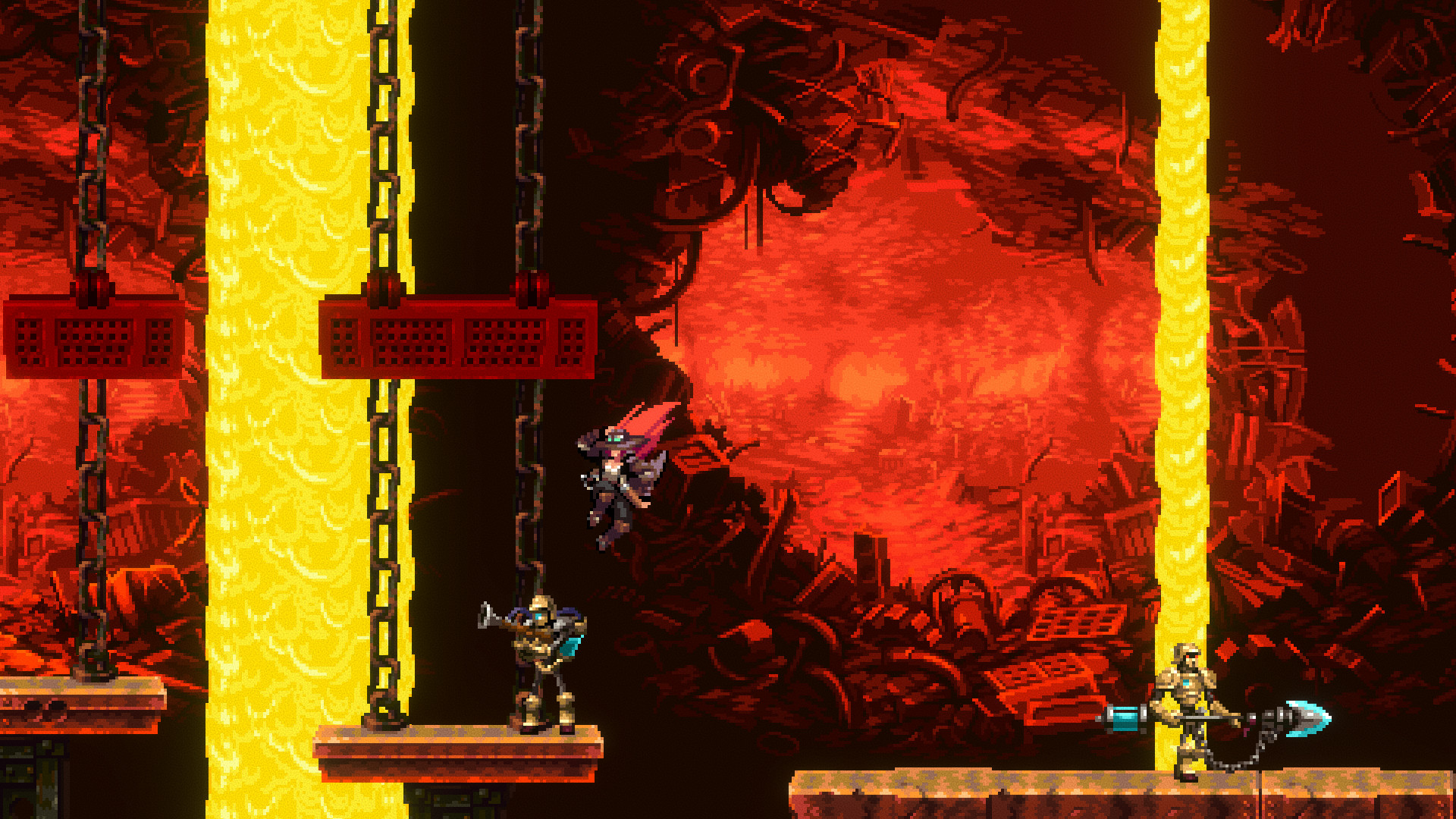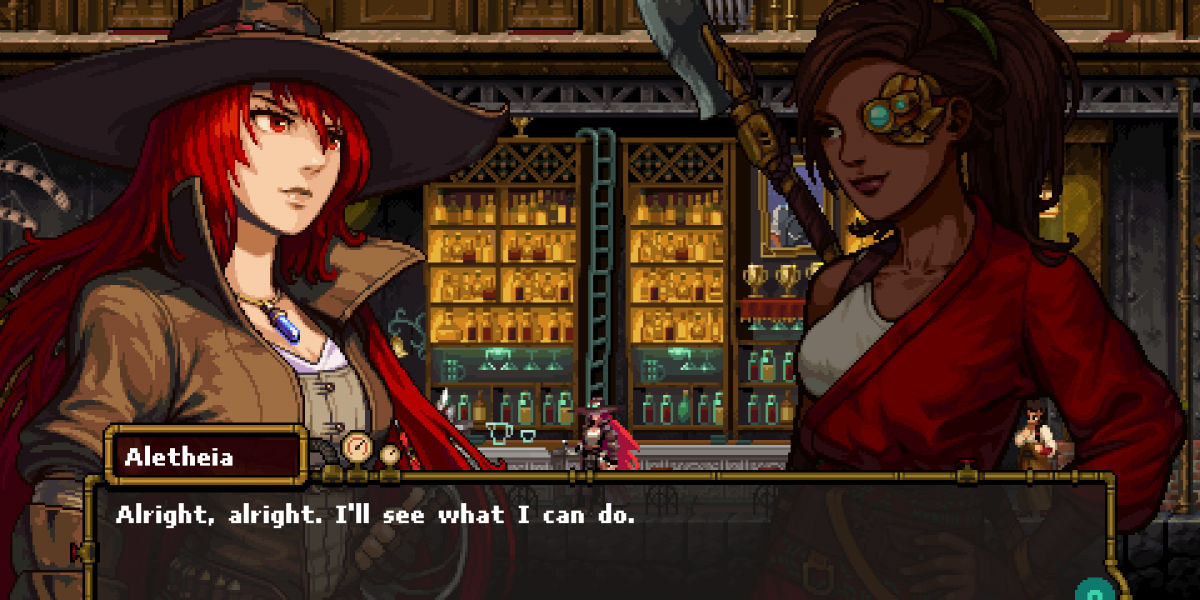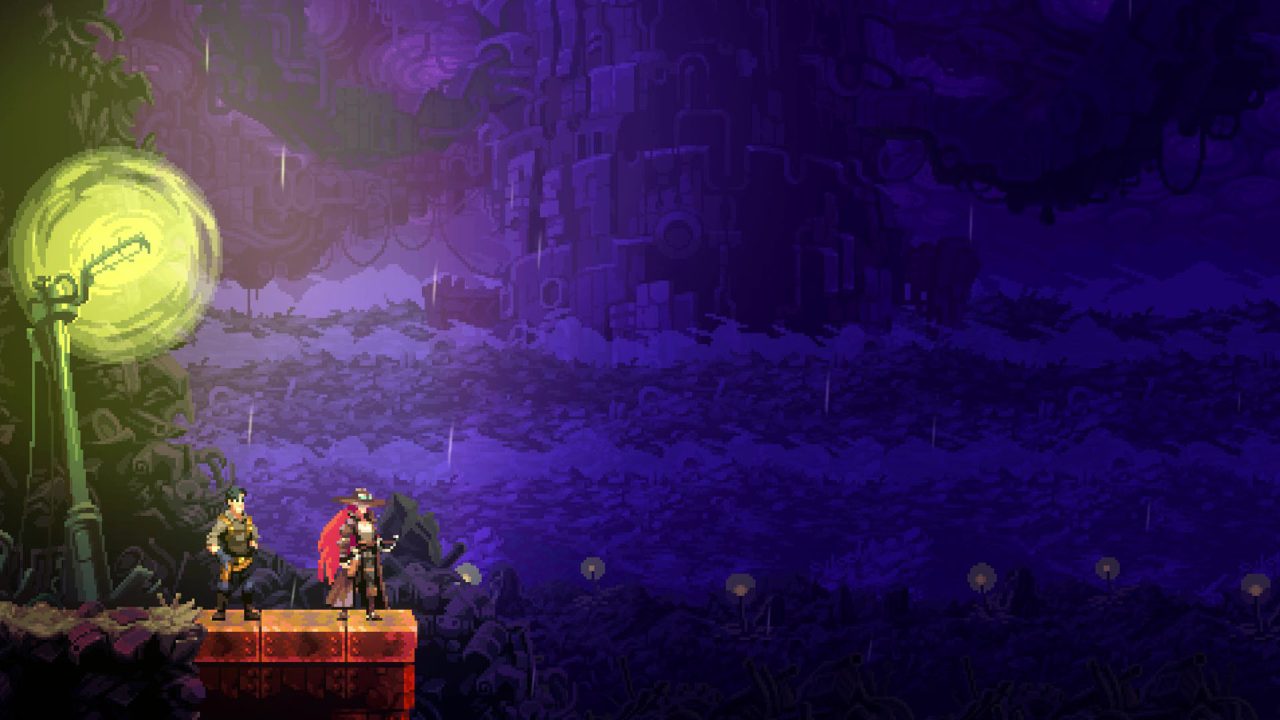The first thing that will catch most peoples’ eyes with Gestalt: Steam & Cinder is its flawless polish. It certainly was for me when I booted up the game for the first time. I found gorgeous pixel artwork in every corner of Gestalt’s steampunk world accompanied by some of the smoothest animations I have ever seen in a Metroidvania. My recent experiences in making a short 2D sidescrolling platformer for a team project further elevated my appreciation for this level of polish. The care and effort put into moving the pixels of every frame of every animation, the careful balancing of states and physics to get the movement feeling just right, and the countless iterations it takes to reach this level of refinement; praising Gestalt from a developer’s point of view of finishing a truly Herculean task is an easy ask.
Nowhere is the polish better demonstrated than the aesthetics and the buttery smooth feel of the game itself. I have to give special praise to how Aletheia, Gestalt’s badass mercenary protagonist, feels to play, especially once you begin unlocking movement upgrades. A generous boost at the end of every jump and dash makes for some positively hypnotizing platforming, and the smart omission of pixel-perfect obstacles for the movement puzzles ensures that players never break out of the flow of movement.
This intelligent level design is present for most of the game. Featuring Metroidvania hallmarks like vertically focused traversal loops into shortcuts, I was pleasantly surprised at the restraint demonstrated in the overall scope of the levels (unlike some other relatively recent titles). They feel great to get lost in and explore, but are never so large as to feel like a chore to return to for loot later in the game. My only real gripe here is that there are so few of them overall, making for a decidedly short runtime of only eight hours.

The short runtime has an unfortunate knock-on effect causing the narrative to feel rushed, if not unfinished at times. The story starts with a lengthy exposition dump about the history of Canaan, the Steam City, and how it came to be after a terrible war against the Demons from the Abyss. The twist here is that the humans that harnessed the Abyss’ power to fight the demons (known as the Akhaians) ended up as the bigger threat at the war’s conclusion. The Akhaians were eventually beaten back beyond the city walls but have been in constant conflict with the city dwellers since then, with the game starting right as the conflict is about to reach its boiling point.
Additionally, the lore isn’t elaborated upon for the rest of the game, as the story involving Aletheia’s adventures in the underbelly of Canaan takes precedence. It’s little more than a plot device to get the main conflict going, further buried under several fetch quests that provide no additional context. This is a shame given that the exposition dump ends up being more organized and interesting than the moment-to-moment story itself. From cutscenes that feebly attempt to paint a looming conspiracy to extremely unsatisfying resolutions to every story thread, Gestalt’s narrative was testing at the best of times.
The narrative’s flaws become especially apparent with the frequency of the middling cutscenes that don’t even involve Aletheia most of the time. Given that she is the best part of the game from both a narrative and gameplay point of view, I can’t help but question the purpose of this design choice.

Questionable design choices also bleed into other parts of the gameplay, mainly in the form of player progression. Leveling up is a boring affair, as minuscule stat-ups make up most of the nodes in the skill tree. Larger nodes that instead unlock new parts of Aletheia’s moveset occasionally break up this monotony, but this ends up as little more than fluff thanks to how clunky most of the new moves are to execute.
While Gestalt‘s weaving of melee and ranged damage is an interesting dance early on, the loop quickly falls apart due to the huge disparity in quality between gun and sword upgrades.
New additions to the light attack string needlessly drive Aletheia forward, often putting her directly into enemy lines of fire. In contrast, the unlocked heavy attacks drain precious energy that could be spent on much more powerful ranged attacks with the pistol. The follow-up attack from a backward dodge is about the most practical melee move you’ll unlock, with all the later upgrades failing to make a practical impact on gameplay.
On the other hand, a decked-out pistol feels immensely powerful, often one-shotting most enemies even in late game sequences. The sky-high damage coupled with stamina-draining utility made even boss encounters feel like nuisances more than engaging battles.

Sound is similarly unbalanced; while the general soundscape is quite impressive, some parts feel overdone. In particular, the robot attacks in the early game are some of the biggest culprits, with electric batons that sound like attacks from Mjolnir and re-arming noises that wouldn’t sound out of place in a Transformers movie.
I can’t help but wonder how much better Gestalt would have turned out with a couple more months in the oven. From the story to the combat to player progression, every aspect of actually playing the game feels more than a couple of iterations short of reaching the magnificent polish of the visuals. That being said, for scratching the occasional Metroidvania itch, Gestalt: Steam and Cinder is a worthwhile eight-hour investment.


